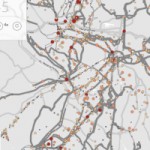 The idea of using mobile devices to reduce traffic congestion in our cities is not a new one. For instance, last year a MIT study used the data we transmit from our mobile devices to map traffic congestion more accurately. They used three weeks of cellphone data to obtain information about anonymous drivers’ routes and the estimated traffic volume and speed on those routes both in Boston and the San Francisco Bay Area.
The idea of using mobile devices to reduce traffic congestion in our cities is not a new one. For instance, last year a MIT study used the data we transmit from our mobile devices to map traffic congestion more accurately. They used three weeks of cellphone data to obtain information about anonymous drivers’ routes and the estimated traffic volume and speed on those routes both in Boston and the San Francisco Bay Area.
This information was then combined with knowledge of population densities and information about the road network in those areas. This was used to understand both which areas were the largest sources of drivers and how they moved from local roads to main roads.
Later that year, IBM completed a similar study using mobile data from motorists in the Ivory Coast to try and provide town planners with better insight into how to design transport networks throughout the country.
A new project emerging is taking a slightly different tact. They’re aiming to use mobile devices to encourage people to take less congested routes to their destination. The project, called Urban Engines, is based upon the commuter cards, like the Oyster system here in London, that are common throughout the world. The system takes the data from these cards and uses them to identify both the areas of heaviest congestion and the time that congestion occurs.
The system has been deployed in a number of places, but has arguably seen the best results in Singapore. Commuters there can use the system to earn rewards whenever they use their travel card. Every kilometre traveled during peak hours will earn them one point, with three points for every kilometre traveled off peak. These points can then be used for discounts on future journeys, or towards a raffle like game whereby they could win cash prizes.
The developers claim that using the system has seen a 7-13% reduction in journeys made during peak hours in Singapore, with over 200,000 commuters having signed up thus far. This compares favourably to the initial deployment of the system in Bangalore, whereby 20,000 Infosys employees were nudged into reducing their peak time travel by 17% within six months. This initial success was replicated elsewhere, and the hope is that more cities will begin to take up the system.
It’s a really nice example of how modern technologies can work effectively together to produce social benefits. Hopefully we’ll see a version of it in London before long.
Interesting video on this here https://www.youtube.com/watch?v=lwT0yus7gG4
Good find, thanks for sharing Julio